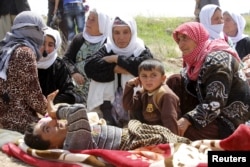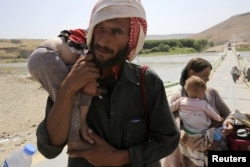Christian relief organizations are being accused of exploiting aid to proselytize and convert Yazidi refugees in Iraq’s Kurdistan, promising them it will increase their chance of securing visas to the West.
The allegation was first raised last month by a Yazidi member of the Kurdish parliament Vian Dakhil, who complained that Christian missionaries were exploiting the trauma many of the thousands of Yazidi refugees have been enduring by trying to convert them.
"Attached with humanitarian aid they distribute bibles and pamphlets containing information about Christianity,” the Yazidi lawmaker told reporters in Irbil.
In a later statement, the lawmaker said Yazidi officials had been observing Christian groups inside refugee camps working to persuade Yazidis to convert to Christianity. “Yazidi Kurds have faced murder and displacement, making the ancient ethnic religious community highly vulnerable," she said in a statement.
Persecuted group
Yazidis in Iraq have long been persecuted and have traditionally held themselves apart in small communities scattered across northwest Iraq, northwest Syria and southeast Turkey with most living in and around the mountainous Sinjar region.
More than 100,000 fled Sinjar since August 2014 when Islamic State extremists launched a vicious offensive on the region that saw Yazidi women being kidnapped and enslaved and the men butchered.
Yazidis' faith is historically linked to Zoroastrianism, a dualistic religion that shares some elements of Christianity and Islam.
Since the 11th century, the community has come close to extinction several times but the Islamic State’s attack on the community represents the greatest threat to the Yazidis in modern times.
According to Nazand Begikhani, an adviser to the Kurdistan regional government and researcher at the University of Bristol Gender and Violence Research Center, Islamic State militants kidnapped more than 2,500 Yazidi women during the group’s drive into Sinjar.
Yazidi activists say they have compiled a list of at least 4,600 missing Yazidi women, seized after they were separated from male relatives, who were shot.
Proselytizing motive
Some Western evangelical groups have made little effort to disguise a proselytizing motive underlining their humanitarian missions in Iraq’s Kurdistan. Some groups identified the Yazidi refugee influx into Kurdistan as a “golden opportunity” for conversion.
U.S.-based non-profit Christian Aid Mission highlighted in one report on its website how Yazidis were “once inaccessible to native Iraqi missionaries, as members lived reclusively in distant mountains near the border with Turkey” but once Islamic extremists stormed their strongholds last summer forcing them to flee, missionary work became easier.
An Iraqi ministry director is quoted as saying: “It was very far and very difficult for us to go there to reach these people, so the Lord just brought them to us.”
He describes the conversion of a 15-year-old Yazidi boy who lost two sisters to Islamic State kidnappers.
When the ministry director met him in Dohuk, the boy was trying to help his mother and father survive by asking people if he could shine their shoes for the equivalent of less than 25 cents.
“He told me this story with tears,” the director said. “His dad was paralyzed because of what happened to the family when IS kicked them out. The boy hadn’t eaten for days."
'Coming to Christ'
The report notes that while brutality of the Islamic extremist group Islamic State has “contributed to many Muslims in Iraq and Syria coming to Christ, in the past six months about 70 percent of those displaced to the northern Iraqi cities of Irbil and Dohuk have embraced Christ through one ministry’s outreach are Yazidis.”
The group said it had converted 80 large families. The average size of a Yazidi family is between seven and 10, suggesting that Christian Aid Mission alone may have converted as many as 800 Yazidis.
Yazidi officials argue the conversions are highly exploitative with many of the families being targeted, traumatized and fearful about their future.
The complaint of Yazidis about the conversion efforts has drawn the ire of some outlier Western Christian groups.
Walid Shoebat, a controversial Palestinian-born Christian convert and anti-Islam activist based in the U.S., argues that Christians answered the call to aid.
“What did they get in return,” Shoebat asked rhetorically in a Web article criticizing Yazidi lawmaker Dakhil.
He said Dakhil prefers that “they worship Lucifer instead of Jesus. Yazidis are known for their hatred to Christianity, especially missionaries.”
Christian ban urged
Dakhil has urged the Kurdish government in Irbil to block the missionary activities and prohibit some Christian groups from entering refugee camps in Iraq’s Kurdistan housing up to 130,000 Yazidis.
The Kurdistan region’s office of Christian affairs said most of the established Christian aid groups and churches in the region behave ethically and are not pushing conversion.
The problem lies with newer, upstart missions, officials say.
Another Yazidi official, Khairy Bozani, has dubbed the conversion effort as a “threatening phenomenon,” alleging Christian missionaries have even offered cash to young Yazidis to convert.
American Christian and conservative groups have started to campaign for Christian refugees from the Mideast to be given priority when it comes to resettlement in the U.S. Some groups complain that the Obama administration hasn't shown willingness to rescue Christian refugees – converts or otherwise.
Similar calls are being made in Europe for Christian refugees from Iraq and Syria to be given priority over other religious minorities or Muslims.
On Monday a former Archbishop of Canterbury accused British Prime Minister David Cameron of failing to help Christians in the Middle East who are fleeing the atrocities of the Islamic State group.
Christians at risk
Lord Carey said Cameron was guilty of turning his back on fellow Christians who are at risk of massacre in Syria and Iraq.
And the Barnabas Fund, a U.K.-based international Christian relief organization that channels the majority of its aid to Christians living in Muslim countries, has launched a petition calling on the U.K. government to “welcome Christian refugees and give them priority as asylum-seekers.”
Rights groups and the U.N. frown on prioritizing any religious group when it comes to offering resettlement, but Syrian and Iraqi refugees believe that Christians have a better chance of securing visas.







